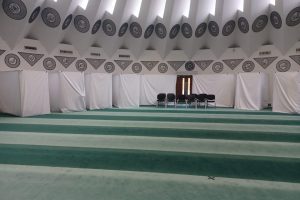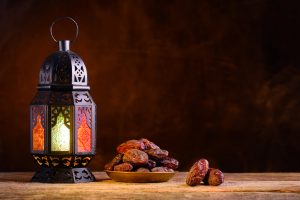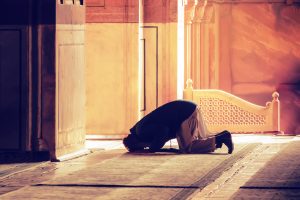
Among the wonders of this kind of fasting that I experienced are the fine visions which were bestowed upon me during that time. I met some past Prophetssa and some of the exalted Muslim Auliya’.[1] Once—in a state of complete wakefulness—I met the Holy Prophetsa along with Hassanra, Hussainra, ‘Alira and Fatimahra. This was not a dream, but something that I experienced in a state of wakefulness. I met many holy people in this manner, but it would take long to describe all those meetings. Moreover, I was granted views of spiritual lights that were represented in columns of red and green, the beauty of which cannot possibly be described in words. These columns of light, some of them shining white and others green and red, rose straight towards heaven and their sight filled my heart with delight. Nothing can be compared to the joy that my heart and soul experienced in beholding these columns. I believe that these columns were a representation of the love between God and man. It was a light that proceeded from the heart upwards and there was another light that descended from above and the two together took on the shape of a column. These are spiritual matters which are beyond the ken of the world. The world cannot recognise them as they are far removed from its eyes, but there are some in the world who are made aware of them. In short, due to this prolonged fasting, wonders were revealed to me in the form of visions of various kinds and forms.[2]
Both fasting and Salat [prayer] are forms of worship. The fast affects powerfully the body and Salat affects powerfully the soul. Salat generates a condition of burning and melting of the heart, and is, therefore, a higher form of worship than fasting. The latter fosters the capacity for visions.[3]
It should be remembered that the fast does not mean merely that a person should abstain from food and drink over a certain period. During the fast one should be occupied greatly with the remembrance of God. The Holy Prophetsa occupied himself greatly with worship during the month of Ramadan. During that month one should discard one’s preoccupation with eating and drinking; and cutting asunder from these needs, should address oneself wholly towards God. Unfortunate is the person who is bestowed material bread and pays no attention to spiritual bread. Material bread strengthens the body, and spiritual bread sustains the soul and sharpens the spiritual faculties. Seek the grace of God, as all doors are opened by His grace.[4]
It may be asked what is the attitude of the Holy Qur’an towards the natural state of man, what guidance does it furnish concerning it and how does it seek to control it? The answer is that according to the Holy Qur’an the natural state of man has a very strong relationship with his moral and spiritual states, so much so that even a person’s manner of eating and drinking affects his moral and spiritual states. If the natural state of a person is subjected to the control of the directions of divine law it becomes his moral state and deeply affects his spirituality, as is said that whatever falls into a salt mine is converted into salt. That is why the Holy Qur’an has laid stress on physical cleanliness and postures, and their regulation in relation to all worship and inner purity and spiritual humility. Reflection confirms that physical conditions deeply affect the soul. For instance, when our eyes are filled with tears, even if the tears are artificially induced, the heart is immediately affected and becomes sorrowful. In the same way, when we begin to laugh, even if the laughter is artificially induced, the heart begins to feel cheerful. It has also been observed that physical prostration in prayer induces humility in the soul. As a contrast when we draw ourselves up physically and strut about with our neck raised and our breast pushed forward, this attitude induces a mood of arrogance and vain glory. These instances establish clearly that physical conditions certainly affect spiritual conditions.[5]
Endnotes
- Men of God or Saints.
- Kitab-ul-Bariyyah, Ruhani Khaza’in, Vol. 13, pp. 180-181, footnote (English Translation: The Essence of Islam, Vol. 4, p. 24-25).
- Malfuzat, Vol. 7, p. 379, (English Translation: The Essence of Islam, Vol. 2, p. 316).
- Speeches to Jalsa Salana 1906, p.20 (English Translation: The Essence of Islam, Vol.2, p.316).
- Hazrat Mirza Ghulam Ahmadas, The Philosophy of the Teachings of Islam (Tilford, Surrey, UK: International Publications, 2010), 8-9.




Add Comment